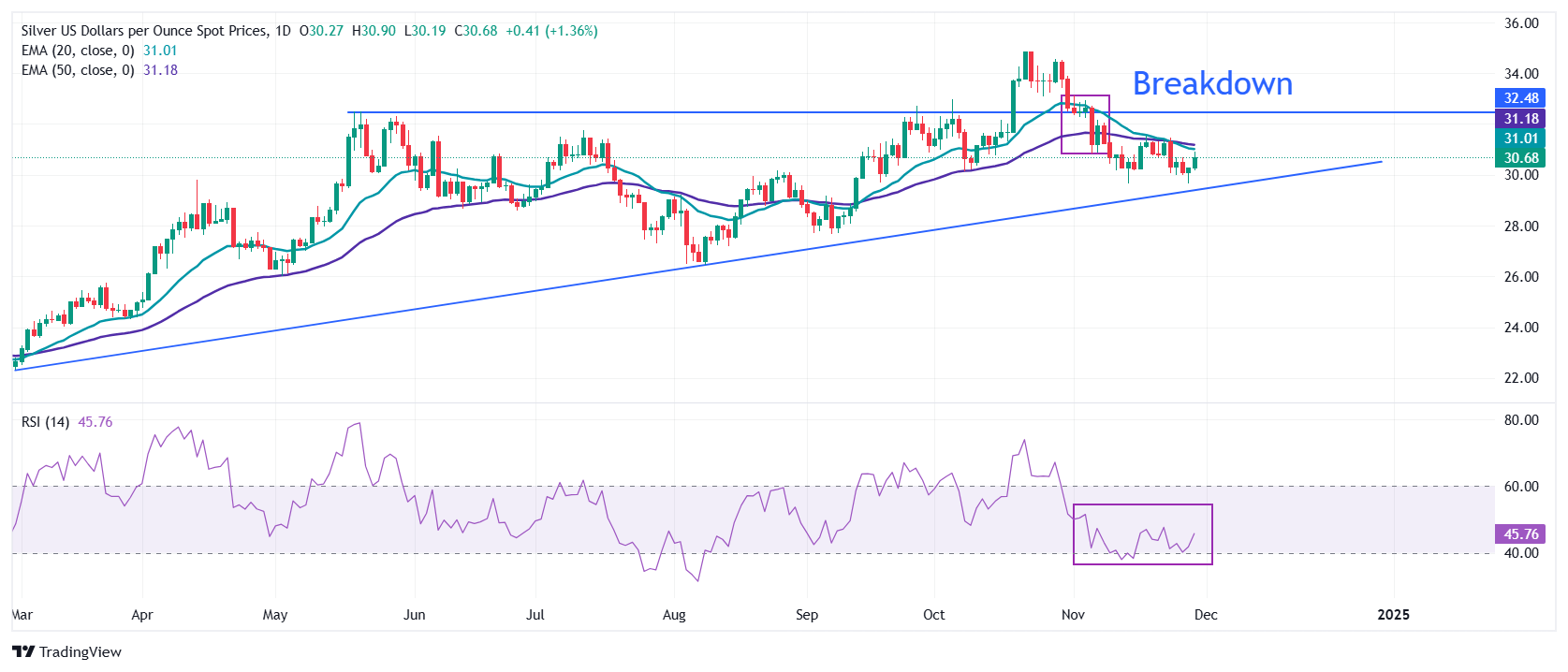Silver Price Forecast: XAG/USD extends recovery to near $31.00 as safe-haven demand improves
- Silver price extends its recovery to near $31.00 as demand for safe-haven asset improves.
- Russia threatens to attack Ukraine with nuclear-capable ballistic missiles.
- The US Dollar recovers with investors focusing on a slew of US economic data.
Silver price (XAG/USD) recovers further to near $31.00 in North American session on Friday. The white metal bounced back on Thursday after posting a fresh 11-week low near $29.60. The asset strengthens as investors fear that Russia could launch a nuclear attack on Ukraine.
Russia threatens a possible nuclear-capable ballistic missile strike on Ukraine, followed by firing a series of Intermediate Range Ballistic Missiles (IRBM) on 17 targets, including defense and energy facilities. The prevailing war between Russia and Ukraine keeps the demand for safe-haven assets intact. This was the second-largest Russian attack on Ukraine, according to Ukraine's energy ministry. Historically, the safe-haven appeal of precious metals such as Silver increases at times of global market uncertainty or heightened geopolitical risks.
In the Middle East, tensions between Israel and Iran have eased, with a ceasefire coming into effect early this week.
Meanwhile, the US Dollar (USD) rebounds strongly as investors shift focus to the United States (US) labor market and business activity data, which will be released next week. The US Dollar Index (DXY), which tracks the Greenback’s value against six major currencies, bounces back after posting a fresh two-week low near 105.60.
Silver technical analysis
Silver price rebounds strongly after sliding to near the upward-sloping trendline around $29.50, which is plotted from the February 29 low of $22.30 on a daily timeframe. Still, the outlook of the Silver price is bearish as a bear cross, represented by 20 and 50-day Exponential Moving Average (EMA) around $31.30, points to an escalation in the downside trend.
The white metal weakened after the breakdown of the horizontal support plotted from the May 21 high of $32.50.
The 14-day Relative Strength Index (RSI) oscillates in the 40.00-60.00 range, suggesting a sideways trend.
Silver daily chart

Silver FAQs
Silver is a precious metal highly traded among investors. It has been historically used as a store of value and a medium of exchange. Although less popular than Gold, traders may turn to Silver to diversify their investment portfolio, for its intrinsic value or as a potential hedge during high-inflation periods. Investors can buy physical Silver, in coins or in bars, or trade it through vehicles such as Exchange Traded Funds, which track its price on international markets.
Silver prices can move due to a wide range of factors. Geopolitical instability or fears of a deep recession can make Silver price escalate due to its safe-haven status, although to a lesser extent than Gold's. As a yieldless asset, Silver tends to rise with lower interest rates. Its moves also depend on how the US Dollar (USD) behaves as the asset is priced in dollars (XAG/USD). A strong Dollar tends to keep the price of Silver at bay, whereas a weaker Dollar is likely to propel prices up. Other factors such as investment demand, mining supply – Silver is much more abundant than Gold – and recycling rates can also affect prices.
Silver is widely used in industry, particularly in sectors such as electronics or solar energy, as it has one of the highest electric conductivity of all metals – more than Copper and Gold. A surge in demand can increase prices, while a decline tends to lower them. Dynamics in the US, Chinese and Indian economies can also contribute to price swings: for the US and particularly China, their big industrial sectors use Silver in various processes; in India, consumers’ demand for the precious metal for jewellery also plays a key role in setting prices.
Silver prices tend to follow Gold's moves. When Gold prices rise, Silver typically follows suit, as their status as safe-haven assets is similar. The Gold/Silver ratio, which shows the number of ounces of Silver needed to equal the value of one ounce of Gold, may help to determine the relative valuation between both metals. Some investors may consider a high ratio as an indicator that Silver is undervalued, or Gold is overvalued. On the contrary, a low ratio might suggest that Gold is undervalued relative to Silver.